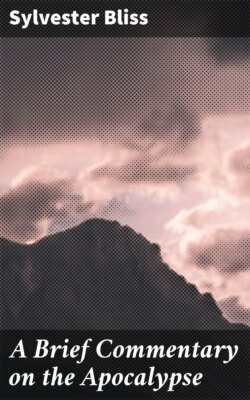Читать книгу A Brief Commentary on the Apocalypse - Sylvester Bliss - Страница 14
На сайте Литреса книга снята с продажи.
Epistle to the Church in Sardis.
ОглавлениеTable of Contents
“And to the messenger of the congregation in Sardis write: These things saith He, who hath the seven Spirits of God, and the seven stars: I know thy works, that thou hast a name that thou livest, and art dead. Be watchful, and strengthen the things, which remain, which are about to die: for I have not found thy works complete before God. Remember therefore how thou hast received and heard, and hold fast and repent. If therefore thou shalt not watch, I will come on thee like a thief, and thou wilt not know what hour I will come on thee. But thou hast a few names in Sardis, that have not defiled their garments; and they will walk with me in white: for they are worthy. He, who overcometh, the same one will be clothed in white raiment; and I will not blot out his name from the book of life, but I will acknowledge his name before my Father, and before his angels. He, who hath an ear, let him hear what the Spirit saith unto the congregations.”—Rev. 3:1–6.
The church in Sardis was Christian in name, but was destitute of spiritual life, with the exception of a few names who had not defiled their garments. Having become dead to the revivifying influences of the Holy Spirit, they are reminded that he who addresses them is the one who holds their messenger in his hand, and who hath the seven Spirits of God; i.e., that it was from the One [pg 044] who said of “the Comforter, which is the Holy Ghost” (John 14:26), “when the Comforter is come, whom I will send unto you from the Father, even the Spirit of truth which proceedeth from the Father, he shall testify of me,” Ib. 15:26.
They had doubtless become greatly conformed to the corrupt worldly influences by which they were surrounded, without having actually denied the faith, or embraced the hated doctrines of the Nicolaitanes. Therefore they were exhorted to hold fast all that they still retained, and, by repentance, to recover what they had lost; and they were admonished that if they neglected those precautions, they would be suddenly visited; without its being designated what would be the precise nature, time, or manner, of their visitation: which made the threatening the more terrible.
The “few names” which had not defiled their garments, were used by a metonymy to signify persons. When an apostle was to be chosen in the place of Judas, “the number of the names together were about one hundred and twenty,” Acts 1:15. Purity of raiment is significant of purity of character: “Blessed is he that watcheth and keepeth his garments,” 16:15. White is an emblem of purity. To the “bride,” it “was granted that she should be arrayed in fine linen clean and white: for the fine linen is the righteousness [pg 045] of the saints,” 19:8. Those who came out of great tribulation, had “washed their robes and made them white in the blood of the Lamb,” (7:13); and therefore they were symbolized as standing before the throne and before the Lamb, clothed with white robes, and palms of victory in their hands, 7:9. To be clothed in white raiment, is therefore to be accepted of the Saviour.
To blot one's name out of the book of life, is to erase his title to heaven. The figure seems to be an allusion to the ancient custom of enrolling in a book the names of all free citizens. If their names were confessedly written there, they were entitled to all the privileges and immunities of citizenship; but if blotted out, they had forfeited these. “They that dwell on the earth shall wonder, whose names were not written in the book of life from the foundation of the world, when they behold the beast that was, and is not, and yet is,” 17:8. Moses said, if God would not forgive Israel, “blot me, I pray thee, out of thy book which thou hast written,” Ex. 32:32. Of his enemies, David said, “Let them be blotted out of the book of the living, and not be written with the righteous,” Ps. 67:28. Those only enter the New Jerusalem, “which are written in the Lamb's book of life,” 21:27.
The church in Sardis, has long been utterly extinct; and what remains of the city is a miserable Turkish village.
[pg 046]
